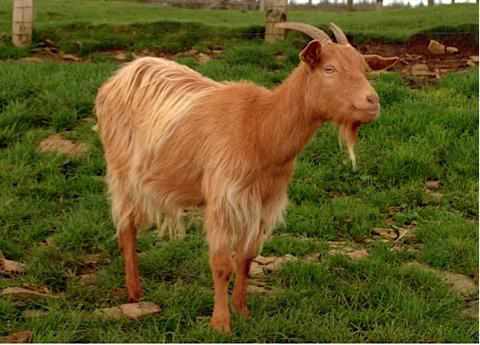Civil servant Brenda Nicolle says she wants those responsible to understand that their actions have had fatal consequences.
Last year Ms Nicolle took in one year old Gerry, a golden Guernsey, having wanted to keep a goat for a long time. The animal became a family pet and, according to the 40-year-old, was ‘like a big dog’.
She went on to look after Gerry, paying £200 for a life-saving operation to stop the animal’s horns growing inwards, and cared for him during a six-month recovery period.
But on Tuesday she visited the St Helier farm where the animal lived to find that it had drowned after falling into a water tank, having been untethered.
Ms Nicolle, a St Saviour resident, suspects that young Islanders may be responsible as sweet wrappers and fizzy drinks cans have been found at the farm in the past.
She said: ‘Somebody has been going onto the farm, going into my shed and doing things like lifting the chicken boxes – you can see that people have been there.
‘Somebody unclipped the goat between 2 pm and 4 pm on Tuesday. They must have startled it as it ran to go into its night-time shelter, breaking things on the way.
‘Where he stays during the night is locked during the day so he couldn’t get in. To try to get to safety he jumped onto a water tank, but broke through and drowned in the water.
‘I was totally devastated after all the work we had done in looking after him. We had done everything correctly and he was like a family pet – he was like a big dog.’
Ms Nicolle, who grew up in Jersey, said she accepted that some people disagreed with tethering animals, but said that they had done so legally, with an appropriate length rope and twisting stake to prevent choking. She said that Gerry always had fresh grass to eat and space to move.
She has now placed a sign at Gerry’s former home to let those responsible know what has happened to her pet.
The States employee said she had also contacted the police and veterinary affairs, but that there was little that could be done.
She explained that she presumed it was young, school-aged Islanders who may be responsible because of the time the untethering was carried out.
‘Who would go into a hen house?’ she said.
‘I don’t want to blame them or make them feel guilty, I just want them to know that if people mess around with things they don’t understand there are consequences.
‘The consequence in this case is that this goat has died when it didn’t need to.’

- The first records relating to the Golden Guernsey date back to around 1826, when the breed was mentioned in an island guide book.
- Despite its name the animal can range in colour from pale blond to deep bronze. Their coats vary in length and they are more fine-boned than other English milking goats.
- It is considered to be a rare breed of goat, which was first introduced to Britain in 1965.
- They are known to be docile and friendly animals, but male Golden Guernseys are said to be unusually smelly.
- Its milk has a relatively high butterfat and protein content, but produces a smaller milk yield than most Swiss goats.
- The ancestors of the Golden Guernsey are believed to have been the Oberhasli and Syrian breeds.
- Its exact origins are not known, but goat bones have been found in Guernsey dolmens dating to 2000 BC.






